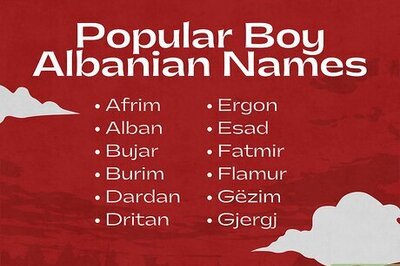
views
The Prime Minister of Pakistan-occupied Jammu and Kashmir (PoJK) Chaudhry Anwarul Haq has said that before the passage of the 13th Amendment, it was the Kashmir Council that was responsible for levying tariffs on electricity. However, after the passage of the 13th Amendment, the authority to levy tariffs was transferred to the PoJK government. Haq, while addressing the district bar association of Mirpur on September 19, said that in 2022, the agreement was suspended and now his government has taken up the tariff issue with the government of Pakistan once again.
Anwarul Haq’s remarks are a manifestation of the pressure his government feels after the state-wide protests against the additional taxes Pakistan has imposed on electricity bills. For a whole month, the people of PoJK have been on the streets protesting. And there is no sign of it withering away in the near future. The PM of PoJK has made a demand to Pakistan to hand over control of all 39 electricity grid stations in PoJK to his government. This brings him into direct conflict with the interests of Pakistan, which has been plundering PoJK’s natural resources for the past 77 years.
As I pen down this article, there is a protest sit-in being observed by the Awami Action Committee in the capital of PoJK. Similar sit-ins are being observed in Rawalakot and Kotli in the Poonch division and Mirpur city in the Mirpur division. Pensioners are planning a massive hunger strike campaign in Muzaffarabad against non-payment of their dues for the past three months. The employees of Northern Area Transport Corporation (NATCO) in Pakistan-occupied Gilgit-Baltistan are also observing sit-ins at central bus stations demanding payments of their salaries.
To add insult to injury, the monies cut from the NATCO employees’ salaries for insurance payments has gone missing. It has been revealed that Rs 22 crore (Rs 220 million) was never deposited with any insurance company and that the bureaucracy has siphoned off the money. The current status of the people’s resistance movement against taxes and shortages of basic daily essentials such as flour, wheat, sugar and others lacks a clear-cut political direction and therefore, there is grave danger that this movement degenerates into factional fights among those organisations which are conducting protests, leading to the failure of bearing positive results.
But more importantly, one must be aware of the tactics being applied by the deep state of Pakistan to divide and split the current people’s protest campaign into communal anarchy. I would like to present here two such examples that might help my reader understand what is it that I mean.
On August 31, a general strike was observed all over PoJK. On September 5, another general strike was observed in the Poonch and Mirpur divisions while in the third division of Muzaffarabad, solidarity protests were held. Immediately after that, allegedly on the instructions of the Pakistani deep state, religious fanatic organisations were mobilised in PoJK. One such organisation is the ‘Tehreek e Tahafuz e Khatam e Nabuwat’ (Movement for the protection of the finality of the Prophet).
From September 5 to this day, religious conferences are being held in every small and big towns and cities across PoJK targeting the Ahmadiyya community. On September 19, a fascist student organisation ‘Islami Jamiat e Tulba’ (Islamic Students Organisation), with links to the ISI, announced to hold meetings in educational institutions under the banner of ‘students rights campaign’ in both PoJK and Gilgit-Baltistan.
Pakistan’s military establishment has always used its religious proxies to derail democratic struggles against authoritarianism. Today, religious organisations have once again been activated to counter the threat the state of Pakistan faces in the form of a people’s rebellion against the status quo.
In Gilgit-Baltistan, the Pakistani deep state is targeting the Shia Muslims by calling them infidels due to a disagreement on who were the true companions of Prophet Muhammad. In PoJK, religious Sunni organisations are being used to whip up hatred against the Ahmadiyya Muslims. In both instances, the aim is to derail the public movement of civil disobedience and to force the united struggle of all sects of Islam against taxes imposed by Pakistan into communal counter-revolution.
Under the current circumstances, the lack of clear political goals such as liberation from the occupation of Pakistan and reuniting with India poses a real threat to the long-term goals of the struggle for people’s rights. Therefore, it can be said that the current status of the civil disobedience movement in PoJK is at best shaky.
Dr Amjad Ayub Mirza is an author and a human rights activist from Mirpur in PoJK. He currently lives in exile in the UK. Views expressed in the above piece are personal and solely that of the author. They do not necessarily reflect News18’s views.


















Comments
0 comment